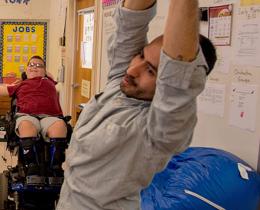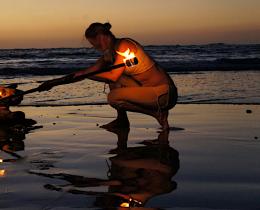Rob: What originally motivated you to do this work, and what continues to motivate you? How, if at all, has that motivation changed over time?
Tommy: I'm motivated from my direct experience of addiction and recovery. But what continues to motivate me is that I despise what addiction does to people in both subtle and gross ways. Addiction will dismantle a person's life. It's relentless, and unless a person is gifted with "surrender," which means having the willingness as well as a path of recovery and available tools, it's unlikely they will live to their potential, if they survive the disease at all.
Rob: Is there a standout moment from your work with veterans and service members?
Tommy: Standout moments teaching yoga to people in recovery happen all the time. Just teaching someone to breathe consciously is worth the price of admission. There's really nothing more needed than to breathe consciously. Everything else in one's personal development comes from that. I've received letters from people over the years who've seen a video of mine or been to a workshop and entered recovery because of it, or felt that their recovery was strengthened because of our interaction. Those moments are gratifying and encourage me to continue to do this work.
Rob: What did you know about the population you are working with before you began teaching? What were some of the assumptions you had about this population and how have those assumptions changed?
Tommy: I knew a lot about the addiction and recovery population before I began teaching. My assumptions were really observations from being a part of this community for 20 years. One of the greatest lessons I've learned has been that different people need different things at different times. There's no "one way" to learn and grow and heal. Though we make generalizations, individuals must always be treated as such. It's from this perspective that a teacher can be most effective, I feel.
Rob: What are two distinct ways that your teaching style differs from the way you might teach in a studio, and what are the reasons for these differences?
Tommy: My teaching is pretty similar wherever I teach. Of course, the language of recovery plays a bigger part in teaching people in recovery than if I'm teaching a regular class in a studio. However, I believe that addiction is so vast a problem that almost anyone could relate to recovery language whether they consider themselves addicts or not. For example, I could speak about the concept of powerlessness to any human being. Anyone would get it. People in recovery may get it in a different way, but the lesson would be valuable to anyone looking within their self.
Rob: What has been the greatest challenge in your teaching experience, and what tools have you developed for addressing that challenge?
Tommy: As a teacher, the kinds of challenges I face are things like time management, becoming more efficient, finding time to continue to study and practice and, of course, to communicate what I'm offering. These are hard for me to do. I know yoga works. I've felt it. So now, it's a matter of offering it to people in a compelling way. Of course, one needs to have systems for teachings that help students to progress. Creating these systems is challenging and exciting. It's a constant work in progress.
Rob: What advice would you give to anyone who is going to teach in the population that you work with?
Tommy: To anyone who is going to teach people in recovery, my number one piece of advice is teach only from your own direct experience. If you do not have something in your life, don't teach it. The most powerful, authentic teachings come from direct experience. If you teach from there, you will be a powerful teacher. If not, you will be a signpost, trying to point the way to a destination that you yourself have not reached.
Rob: What are some of your ideas about or hopes for the future of "service yoga" in America in the next decade?
Tommy: My great hope is that yoga and recovery classes will be taught in substance abuse treatment facilities, halfway houses, and sober living environments throughout America. I envision a new format for 12-step meetings, which includes yoga, meditation, and stronger community building in the form of retreats, workshops, and other immersive experiences. When this happens, we'll be far along the road toward greater success overcoming addiction and preventing it in the first place.
Rob: How has this work changed your definition of service? Your definition of yoga? Your practice?
Tommy: This work has not changed my definition of service, but it has helped me to know where I can be useful. That's pretty huge. My definition of yoga remains the same. It means union, connection, and illuminated awareness. My practice has changed significantly through this work. The main focus now is the illumination of consciousness. And yes, I also love being in a healthy, strong body!
Rob: What other organizations do you admire?
Tommy: I admire so many organizations it would be hard to mention them all here, but they include Yoga of 12-Step Recovery, started by Nikki Myers; Against The Stream, started by Noah Levine; and Hazelden Addiction Treatment Center, where I went to drug and alcohol rehabilitation.



